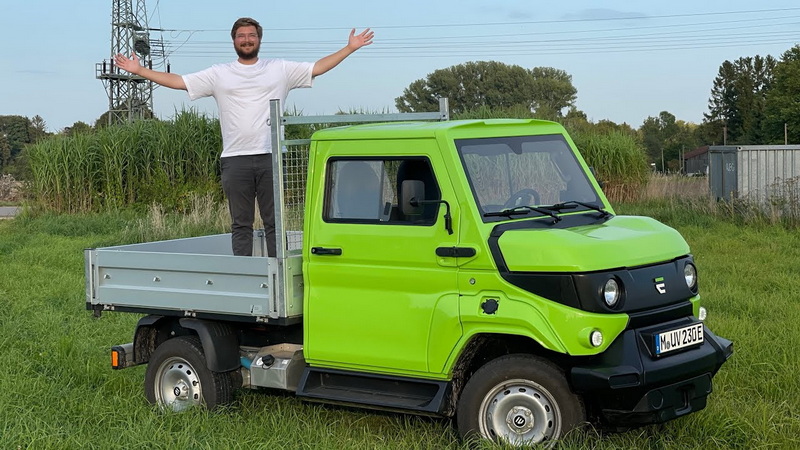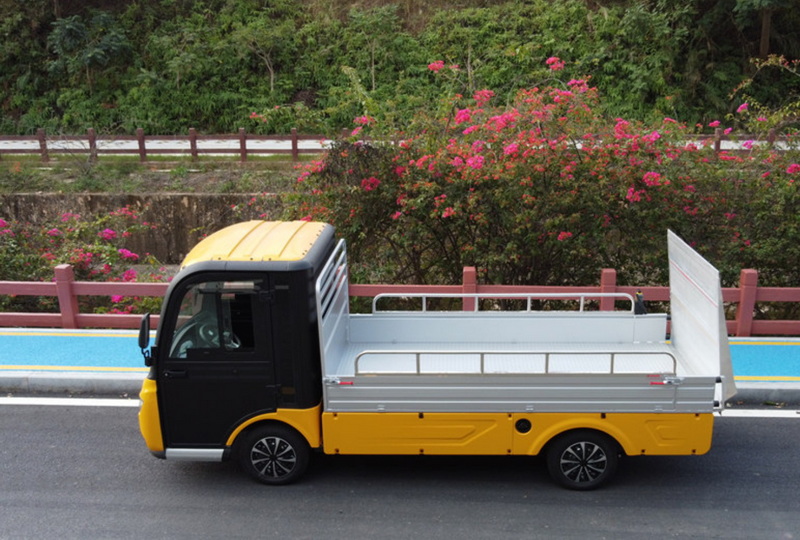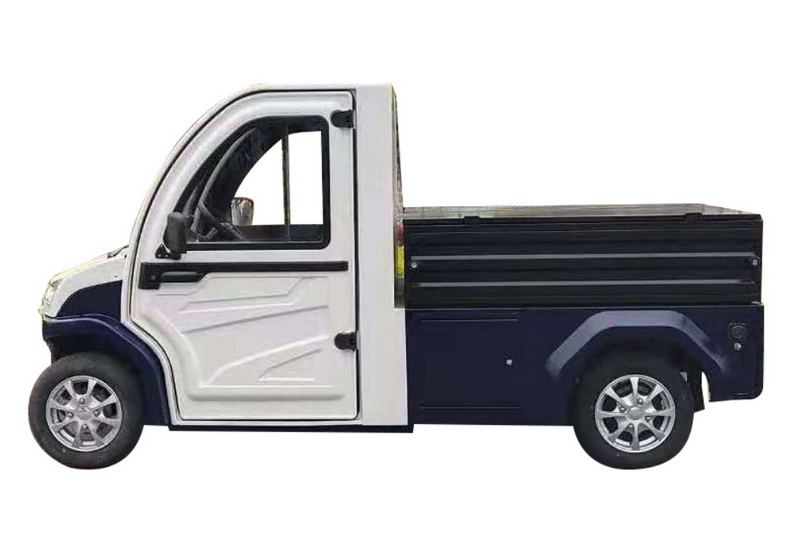Content Menu
● Introduction
● What Are Electric Mini Trucks?
>> Key Features
● The Eco-Friendly Promise of Electric Mini Truck Companies
>> Reducing Carbon Footprint
>> Improving Air Quality and Reducing Noise
>> Energy Efficiency
● Sustainability in Manufacturing and Operations
>> Sustainable Manufacturing Practices
>> Responsible Supply Chain Management
>> Renewable Energy Integration
● Battery Technology and Environmental Impact
>> Battery Production
>> Battery Lifespan and Second-Life Applications
>> Battery Recycling
● Case Studies: Leading Electric Mini Truck Companies
>> Westward Industries: MAX-EV Electric Utility Truck
>> BMW Group: Electric Logistics Trucks
>> TELO Trucks: Compact Electric Pickups
>> Goupil: European Leader in Electric Utility Vehicles
>> Mahindra Electric: Expanding Electric Mobility in Asia
● Regulatory Support and Incentives
>> Emissions Regulations
>> Financial Incentives
>> Infrastructure Investment
● Challenges and Limitations
>> Battery Production and Lifecycle Emissions
>> Charging Infrastructure
>> Upfront Costs
>> Range Limitations
>> Raw Material Sourcing and Supply Chain Risks
>> End-of-Life Management
● The Future of Electric Mini Trucks
>> Advances in Battery Technology
>> Integration with Smart Cities
>> Autonomous and Connected Vehicles
>> Circular Economy Models
>> Global Expansion
● Conclusion
● FAQ
>> 1. What makes an electric mini truck company eco-friendly?
>> 2. Are electric mini trucks truly sustainable throughout their lifecycle?
>> 3. How do electric mini truck companies address battery disposal and recycling?
>> 4. What are the main challenges facing electric mini truck companies?
>> 5. Can electric mini trucks replace all traditional utility vehicles?
Electric mini truck companies are rapidly gaining attention as urban centers and businesses seek sustainable solutions for transportation and logistics. These companies promise a cleaner, more efficient, and eco-friendly alternative to traditional fuel-powered vehicles. But how eco-friendly and sustainable are electric mini truck companies in reality? This comprehensive article delves into the environmental impact, sustainability practices, and long-term prospects of electric mini truck companies, offering insights into their true potential and the challenges they face.

Introduction
The global push for cleaner air, reduced greenhouse gas emissions, and sustainable urban development has placed electric vehicles (EVs) at the forefront of transportation innovation. Among the most promising segments are electric mini trucks—compact, versatile vehicles designed for urban deliveries, facility management, and light-duty logistics. Electric mini truck companies claim their vehicles are not only cleaner to operate but also more sustainable across their entire lifecycle. This article examines these claims, exploring the eco-friendliness and sustainability of electric mini truck companies from production to end-of-life recycling.
What Are Electric Mini Trucks?
Electric mini trucks, sometimes referred to as electric utility trucks (EUTs), are small, battery-powered vehicles built for efficiency and maneuverability in urban and industrial environments. They are typically used for last-mile deliveries, campus maintenance, municipal services, and light commercial tasks.
Key Features
- Compact Size: Designed to navigate narrow city streets and tight spaces.
- Electric Drivetrain: Powered by lithium-ion or other advanced batteries, producing zero tailpipe emissions.
- Customizable Configurations: Adaptable for cargo, passenger, or specialized utility applications.
- Low Maintenance: Fewer moving parts than internal combustion engines, resulting in reduced maintenance needs.
- Quiet Operation: Significantly less noise pollution compared to traditional trucks.
Electric mini trucks are increasingly seen as a vital component of sustainable urban mobility, offering a practical solution to the challenges of congestion, pollution, and rising fuel costs.
The Eco-Friendly Promise of Electric Mini Truck Companies
Electric mini truck companies position themselves as eco-friendly alternatives to traditional vehicle manufacturers. Their primary environmental benefits stem from the use of electric powertrains, which eliminate local emissions and reduce dependence on fossil fuels.
Reducing Carbon Footprint
One of the most significant advantages of electric mini trucks is the reduction in greenhouse gas emissions. According to industry estimates, replacing a single diesel-powered delivery truck with an electric mini truck can prevent several tons of CO₂ emissions annually. For example, BMW's deployment of electric logistics trucks at its Leipzig plant saves around nine tonnes of CO₂ emissions per truck each year.
Improving Air Quality and Reducing Noise
Urban air quality is a growing concern, with transportation being a major contributor to particulate matter and nitrogen oxide emissions. Electric mini trucks produce zero tailpipe emissions, directly improving air quality in cities. Their quiet operation also reduces noise pollution, making them ideal for early-morning or late-night deliveries in residential areas.
Energy Efficiency
Electric drivetrains are inherently more efficient than internal combustion engines, converting a higher percentage of electrical energy from the battery into motion. Regenerative braking systems further enhance efficiency by capturing and reusing energy during deceleration, reducing overall energy consumption.
Sustainability in Manufacturing and Operations
While the operational phase of electric mini trucks is clearly more eco-friendly, true sustainability requires a holistic approach that includes manufacturing, supply chain management, and end-of-life considerations.
Sustainable Manufacturing Practices
Leading electric mini truck companies are investing in sustainable manufacturing processes to minimize their environmental impact. For example, BMW has invested over €900 million in transforming its Leipzig plant for high-voltage battery and EV component production. This transformation includes:
- Energy-Efficient Assembly Lines: Utilizing advanced robotics and automation to reduce waste and energy consumption.
- Reuse of Existing Facilities: Repurposing existing assembly halls to avoid the environmental costs of new construction.
- Waste Reduction Initiatives: Implementing closed-loop systems for materials such as aluminum and plastics.
Responsible Supply Chain Management
Sustainability extends beyond the factory floor. Electric mini truck companies are increasingly scrutinizing their supply chains to ensure responsible sourcing of raw materials, particularly for batteries. This includes:
- Ethical Mining Practices: Ensuring that minerals such as lithium, cobalt, and nickel are sourced from suppliers that adhere to strict environmental and labor standards.
- Supplier Audits: Conducting regular audits to verify compliance with sustainability criteria.
Renewable Energy Integration
Some companies are powering their manufacturing operations and charging infrastructure with renewable energy sources such as solar, wind, or hydroelectric power. This further reduces the overall carbon footprint of electric mini truck production and operation.
Battery Technology and Environmental Impact
The heart of every electric mini truck is its battery. While batteries enable zero-emission driving, their production and disposal present significant environmental challenges.
Battery Production
Lithium-ion batteries are the most common type used in electric mini trucks. Their production involves mining and refining metals such as lithium, cobalt, and nickel, processes that can have substantial environmental and social impacts if not managed responsibly.
- Water Usage: Lithium extraction can require large amounts of water, potentially impacting local ecosystems.
- Toxic Waste: Improper handling of mining byproducts can lead to soil and water contamination.
- Carbon Emissions: Battery manufacturing is energy-intensive, often relying on fossil fuels in regions where renewable energy is not widely available.
Battery Lifespan and Second-Life Applications
Electric mini truck companies are working to extend battery life through advanced battery management systems and improved chemistries. When batteries reach the end of their useful life in vehicles, they can often be repurposed for stationary energy storage, supporting renewable energy grids and reducing waste.
Battery Recycling
Recycling is critical to the sustainability of electric mini trucks. Companies are investing in technologies to recover valuable materials from used batteries, reducing the need for new mining and minimizing environmental impact. Closed-loop recycling systems are being developed to ensure that as many battery components as possible are reused.

Case Studies: Leading Electric Mini Truck Companies
Westward Industries: MAX-EV Electric Utility Truck
Westward Industries' MAX-EV is a versatile electric mini truck designed for urban environments. It features multiple lithium-ion battery options, impressive towing capacity, and a compact footprint for easy navigation.
Sustainability Highlights:
- Multiple battery pack options for range flexibility
- Regenerative braking and efficient power distribution
- Designed for urban utility, construction, and maintenance tasks
BMW Group: Electric Logistics Trucks
BMW's Leipzig and Regensburg plants utilize fully electric trucks for intralogistics, transporting parts and components between facilities. These trucks operate with zero local emissions and are charged using renewable energy, supporting BMW's goal of a carbon-neutral supply chain.
Impact:
- Saves approximately nine tonnes of CO₂ annually per truck
- Reduces noise pollution around plants
- Demonstrates scalable sustainable logistics
TELO Trucks: Compact Electric Pickups
TELO Trucks has redesigned the electric truck footprint for urban adventures and eco-friendly travel, focusing on compact size and high utility.
Key Features:
- Urban-focused design for maneuverability
- Electric powertrain for zero emissions
Goupil: European Leader in Electric Utility Vehicles
Goupil, a French company, specializes in electric utility vehicles for municipal, industrial, and commercial use. Their vehicles are widely adopted by European cities for waste collection, street cleaning, and park maintenance.
Sustainability Initiatives:
- Use of recycled materials in vehicle construction
- Partnerships with local governments to promote green fleets
- Investment in battery recycling and second-life applications
Mahindra Electric: Expanding Electric Mobility in Asia
Mahindra Electric, based in India, produces a range of electric mini trucks and utility vehicles tailored for developing markets. Their focus is on affordability, reliability, and sustainability.
Key Achievements:
- Large-scale deployment of electric mini trucks for last-mile delivery
- Collaboration with government agencies to build charging infrastructure
- Commitment to local sourcing and manufacturing to reduce carbon footprint
Regulatory Support and Incentives
The growth of electric mini truck companies is closely tied to government policies and incentives aimed at promoting clean transportation.
Emissions Regulations
Many cities and countries are implementing stricter emissions standards, low-emission zones, and outright bans on diesel and petrol vehicles in urban centers. These regulations create a strong market incentive for businesses to adopt electric mini trucks.
Financial Incentives
Governments offer a range of incentives to encourage the adoption of electric vehicles, including:
- Purchase Subsidies: Direct grants or tax credits for buying electric mini trucks
- Reduced Registration Fees: Lower costs for registering electric vehicles
- Access to Restricted Areas: Permission for electric trucks to enter low-emission or congestion zones
Infrastructure Investment
Public investment in charging infrastructure is critical for the widespread adoption of electric mini trucks. Many governments are partnering with private companies to build fast-charging networks, making it easier for businesses to transition their fleets.
Challenges and Limitations
Despite their many advantages, electric mini truck companies face several challenges that must be addressed to achieve true sustainability.
Battery Production and Lifecycle Emissions
While electric mini trucks produce zero local emissions, the environmental impact of battery production, especially lithium mining and processing, remains a concern. Companies are working to improve battery recycling and use greener manufacturing processes, but this is an ongoing challenge.
Charging Infrastructure
The success of electric mini truck companies depends on the availability of fast, reliable charging stations. In regions where charging infrastructure is limited, adoption may be slow. Some companies, like BMW, have invested in advanced charging infrastructure powered by renewables, but widespread coverage is still a work in progress.
Upfront Costs
Electric mini trucks often have higher upfront costs compared to traditional trucks, though lower operating and maintenance costs can offset this over time. Government incentives help, but cost remains a barrier for some small businesses.
Range Limitations
Current battery technology limits the range of mini electric trucks, making them best suited for short-haul and urban routes. Advances in battery energy density and charging speed are gradually extending their capabilities.
Raw Material Sourcing and Supply Chain Risks
The supply of critical minerals for batteries is subject to geopolitical risks, price volatility, and potential environmental and human rights concerns. Electric mini truck companies must navigate these challenges by diversifying suppliers and investing in ethical sourcing.
End-of-Life Management
Proper disposal and recycling of batteries and vehicle components are essential to prevent environmental harm. Companies must develop robust systems for collecting and processing end-of-life vehicles.
The Future of Electric Mini Trucks
The electric mini truck sector is poised for significant growth as technology advances, costs decline, and regulatory pressures increase. Key trends shaping the future include:
Advances in Battery Technology
Research into solid-state batteries, alternative chemistries, and improved recycling methods promises to make electric mini trucks even more sustainable and affordable.
Integration with Smart Cities
Electric mini trucks are an ideal fit for smart city initiatives, where they can be integrated with digital logistics platforms, traffic management systems, and renewable energy grids.
Autonomous and Connected Vehicles
The development of autonomous electric mini trucks could further enhance efficiency, reduce labor costs, and enable new business models such as on-demand delivery and shared urban logistics.
Circular Economy Models
Electric mini truck companies are exploring circular economy principles, designing vehicles and batteries for easy disassembly, reuse, and recycling. This approach minimizes waste and maximizes resource efficiency.
Global Expansion
While electric mini trucks are already popular in Europe, Asia, and North America, emerging markets present significant growth opportunities. Companies are adapting their products to meet local needs, climates, and regulatory environments.
Conclusion
Electric mini truck companies are making substantial progress toward eco-friendliness and sustainability. By offering zero-emission vehicles, adopting sustainable manufacturing practices, and integrating renewable energy, these companies are helping to reduce the environmental impact of urban logistics and transport. However, challenges remain, particularly in battery production, raw material sourcing, and infrastructure development. Continued innovation, regulatory support, and industry collaboration are essential for realizing the full potential of electric mini trucks in creating a greener, more sustainable future.

FAQ
1. What makes an electric mini truck company eco-friendly?
An electric mini truck company is considered eco-friendly if it produces vehicles that generate zero tailpipe emissions, uses sustainable manufacturing practices, sources batteries responsibly, and integrates renewable energy into operations.
2. Are electric mini trucks truly sustainable throughout their lifecycle?
Electric mini trucks are more sustainable than traditional trucks during operation, but their overall sustainability depends on responsible battery sourcing, efficient manufacturing, and end-of-life recycling programs.
3. How do electric mini truck companies address battery disposal and recycling?
Leading companies are investing in battery recycling technologies and second-life applications to minimize environmental impact and recover valuable materials from used batteries.
4. What are the main challenges facing electric mini truck companies?
Key challenges include the environmental impact of battery production, limited charging infrastructure, higher upfront costs, and range limitations for certain use cases.
5. Can electric mini trucks replace all traditional utility vehicles?
Electric mini trucks are ideal for urban and short-haul applications but may not yet match the range, payload, or versatility of larger diesel trucks for long-distance or heavy-duty tasks. However, ongoing advancements are rapidly narrowing this gap.










































